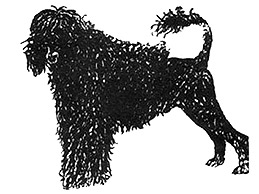Portuguese Water Dog Breed Standard
Last updated: 02 Dec 2015
A breed standard is the guideline which describes the ideal characteristics, temperament, and appearance of a breed and ensures that the breed is fit for function with soundness essential. Breeders and judges should at all times be mindful of features which could be detrimental in any way to the health, welfare or soundness of this breed.

Kennel Club, London 1994
November 2015
-
Group:
Group 6 (Utility)
-
History:
-
General Appearance:
Robust, well balanced, rectangular in outline, very strongly muscled on shoulders. Hard, penetrating and attentive expression.
-
Characteristics:
Very intelligent and tremendously energetic 'fisherman's dog' with great swimming and diving traits.
-
Temperament:
Pleasant disposition, self-willed but very obedient to owner. Brave and tireless.
-
Head And Skull:
Large, well-proportioned skull slightly longer than muzzle, well defined occiput. Stop well defined. Muzzle tapers slightly. Forehead has central furrow for two thirds of length of head. Frontal bones prominent. Nose wide, nostrils well open. Black in black, black and white, and white dogs, liver in brown, brown and white and brown tones.
-
Eyes:
Medium, round, set well apart. Black or dark brown with dark eyerims.
-
Ears:
Heart shaped, dropped, thin, set well above eye level, held close to head, except at back. Tips not below neck line.
-
Mouth:
Scissor bite, jaws strong with a perfect, regular and complete scissor bite, i.e. upper teeth closely overlapping the lower teeth and set square to the jaws, strongly developed canines.
-
Neck:
Short, straight, strongly muscled. Carried high, no mane or dewlap.
-
Forequarters:
Straight, strong boned and well muscled. Shoulders muscular and well laid. Pasterns long and upright.
-
Body:
Chest wide and deep, reaching to elbow. Ribs long, well sprung. Withers wide, not prominent. Back short, good tuck-up, croup only slightly inclined.
-
Hindquarters:
Straight and very strongly muscled, well angulated, buttocks long and well curved, strong hock, metatarsals long, no dew claws.
-
Feet:
Round, rather flat, toes not too long or too knuckled up. Membrane reaching to tip of toes, covered with hair. Central pads very thick.
-
Tail:
Medium set, thick at base and tapering, length not below hock, carried in a ring, clipped, leaving plume at end.
-
Gait/Movement:
Walking, lively short steps. A light trot and energetic gallop.
-
Coat:
Profuse, covering whole body except under forelegs and thigh. Two distinct types, both without undercoats. (1) Hair fairly long, loosely waved with slight sheen, hair on head erect, ears well feathered. (2) Hair short, fairly harsh and dense, compact curls, lacking lustre, head hair similar to body, hair on ears somewhat wavy.
Entire hindquarters clipped from the last rib, tail clipped two-thirds, one third left long.
-
Colour:
Black, white, various shades of brown, black and white, brown and white. Skin bluish under black, white and black and white dogs.
-
Sizes:
Height:
Dogs 50-57 cms (19.5-22.5 ins)
Bitches 43-52 cms (17-20.5 ins)
Weight:
Dogs 19-25 kgs (41 lbs 14 oz - 55 lbs 2 oz)
Bitches 16-22 kgs (35 lbs 4 oz - 48 lbs 8 oz)
-
Faults:
Any departure from the foregoing points should be considered a fault and the seriousness with which the fault should be regarded should be in exact proportion to its degree and its effect upon the health and welfare of the dog.
-
Notes:
Male animals should have two apparently normal testicles fully descended into the scrotum.
 For owners
For owners
 Members
Members
 Dogs Australia is a not-for-profit organisation advocating for the preservation of purebred dogs through ethical breeding.
It champions the highest standard of animal welfare through education and fostering dog-loving communities.
Internationally recognised and established in 1958 as the Australian National Kennel Council (ANKC),
the organisation promotes responsible dog ownership; maintains the ORCHID* heritable canine diseases database;
funds research into canine diseases; and supports state and territory-based member bodies.
Dogs Australia promotes breed conformation shows and community sports for dogs that fulfil a breed’s natural instincts.
Dogs Australia is a not-for-profit organisation advocating for the preservation of purebred dogs through ethical breeding.
It champions the highest standard of animal welfare through education and fostering dog-loving communities.
Internationally recognised and established in 1958 as the Australian National Kennel Council (ANKC),
the organisation promotes responsible dog ownership; maintains the ORCHID* heritable canine diseases database;
funds research into canine diseases; and supports state and territory-based member bodies.
Dogs Australia promotes breed conformation shows and community sports for dogs that fulfil a breed’s natural instincts.







